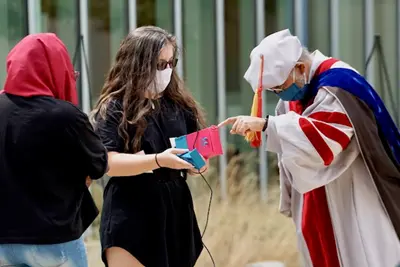Chemistry, Computer Science Students Develop New Skills While Connecting with Peers
 Image by Smita Chatterjee
Image by Smita Chatterjee
08/10/2022
By Brooke Coupal
Because of the COVID-19 pandemic, Emma Goyette missed out on hands-on lab experiences when she took chemistry in high school.
So when she learned about a new summer program for incoming first-year chemistry majors, she made sure to sign up.
“I wanted to get in the labs and see the application of chemistry because, in high school, I didn’t get a lot of that,” says Goyette, of Nashua, New Hampshire.
Nine students took part in CatalyzeUML, a free three-day program, where they got the opportunity to live on campus, meet classmates and build chemistry skills.
“The program provides early exposure to the students to learn about the research that we’re doing here, and it also helps them build community with people that can help them succeed once they start college,” says Chemistry Asst. Prof. Michael Ross, who created CatalyzeUML with Foozieh Mirderikvand, Kennedy College of Sciences (KCS) coordinator of undergraduate programs.
Gaining Hands-On Experience
On day one, students got to work in the laboratories, donning lab coats, goggles and gloves.
 Image by Foozieh Mirderikvand
Image by Foozieh Mirderikvand
The students got to conduct a nanoscience experiment, in which they made nanoparticles based on a process that was discovered in Ross’ lab. The following day, they characterized and analyzed the nanoparticles using instruments, including a transmission electron microscope. They took part in a forensics experiment on the final day, where they used a variety of chemical techniques to look at simulated gunshot residue on gloves.
Peter Barrett ’74, who supported CatalyzeUML with a generous donation, recalled the importance of gaining hands-on experience while he attended UMass Lowell, which was known as the Lowell Technological Institute when he attended.
“I did a research internship with Professor Emeritus Gene Barry, which was rewarding in itself and helped me focus my interests in analytical chemistry,” says Barrett, a partner at Atlas Venture, which provides capital support for biotechnology companies in their early stages. “This experience was instrumental in my career.”
While the incoming chemistry majors were busy in labs, 70 incoming computer science majors were gaining coding skills through SoarCS.
 Image by Brooke Coupal
Image by Brooke Coupal
“I really enjoyed the programs because I didn’t know anything about them until SoarCS,” says Meriem Elkoudi, a first-generation student from Methuen, Massachusetts. “This was a great experience learning new things.”
Students were able to tap their creativity and develop final projects using these technologies. Shruthi Saravanan, of Andover, Massachusetts, and Geo Nakirya, of Burlington, Massachusetts, teamed up to make an online game that their peers could play. They used MYR to create scenes from television shows and then put those images into Python, where their peers could place a guess on what show was being depicted.
“This final project made me reflect on all the programming languages that we learned, and I’ll definitely be practicing more with these throughout the summer,” says Nakirya.
Some of the students will be able to showcase their final projects during Red Hat’s DevConf.US conference on Aug. 20 in Boston alongside Mirderikvand, who will be presenting about SoarCS.
Building Connections
Most students took part in CatalyzeUML and SoarCS to get familiar with the type of work they will be doing in their college classes. But they also left the programs feeling a sense of community.
The chemistry majors, who lived in University Suites during their program, took part in a scavenger hunt throughout North Campus, where they had to take pictures in front of places like the nuclear reactor and Starbucks. They also had some free time, so Goyette, Amanda Marins and Maggie Lagana headed to Build-A-Bear Workshop in Burlington, Massachusetts, where they each made a stuffed animal.
 Image by Foozieh Mirderikvand
Image by Foozieh Mirderikvand
Samson Adeoya, of Manchester, New Hampshire, built connections with fellow incoming computer science majors during SoarCS.
“With all the people I’ve met in my major, if I have any problems or if I need to bounce ideas off someone, I have people to reach out to,” he says.
Current students served as peer leaders for the programs. Ariana Brown, a rising sophomore computer science major, decided to become a SoarCS peer leader through the Immersive Scholars program because of the impact SoarCS had on her as a first-year student.
“The biggest thing with SoarCS was that I met a lot of new people who were also majoring in computer science, and the majority of the people that I’m close with on campus today, I met during the program last summer,” she says.
The students additionally formed relationships with KCS faculty, staff and alumni.
“We want everyone to feel welcomed and supported, and to be successful when they begin their careers as full-time students in the fall,” says Prof. Fred Martin, KCS associate dean for teaching, learning and undergraduate studies and co-founder of SoarCS.
Piquing High Schoolers Interest in Science
 Image by Brooke Coupal
Image by Brooke Coupal
“I heard a lot about cybersecurity, but I never really knew what it was, so I thought it would be good to learn more about it and see if I like it,” says Jack Xiong, who is going into his senior year at Dexter Southfield School in Brookline, Massachusetts.
Thanks to a $150,000 grant from the National Security Agency, students were able to attend the camp for free. The grant also helped pay for 20 new computers for the Cyber Range, says Prof. Xinwen Fu, director of GenCyber.
“The National Security Agency wants high school students to learn about cybersecurity early because nationally, there’s a shortage of cybersecurity personnel,” Fu says. “They hope those students will choose a cybersecurity career so that we can fill that gap.”




